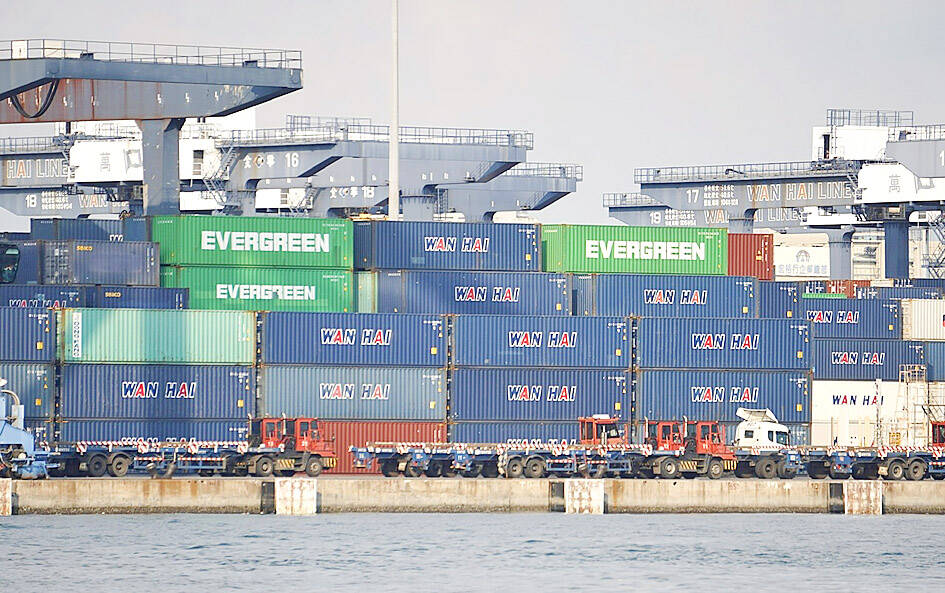Taiwan’s economy last quarter expanded by 3.97 percent from a year earlier, beating the government’s forecast by 0.76 percentage points, as exports proved stronger than expected, the Directorate-General of Budget, Accounting and Statistics (DGBAS) said yesterday.
The showing could boost economic growth to 4.1 percent for this year, the highest in three years and better than the 3.9 percent increase that the statistics agency had projected in August.
Exports of goods and services, the main growth driver, rose 8.67 percent during the July-to-September period, thanks to robust global demand for electronics used in the development of artificial intelligence (AI) and new-generation smartphones, the DGBAS said.

Photo: CNA
Taiwan is home to the world’s major suppliers of AI chips, servers, storage, memory and other devices.
Taiwan Semiconductor Manufacturing Co (TSMC, 台積電), whose clients include Nvidia Corp, Apple Inc, Advanced Micro Devices Inc, Intel Corp and other technology titans, recently posted strong third-quarter earnings and gave a rosy business guidance for this quarter and beyond.
TSMC chairman C.C. Wei (魏哲家) said that the demand for AI is real and still only in its beginning stage, adding that he expected that to benefit the chipmaker for the next five years.
Likewise, ASE Technology Holding Co (ASE, 日月光投控), the world’s biggest chip packaging service provider, yesterday delivered a third-quarter profit of NT$9.67 billion (US$301.9 million), marking advances of 24.27 percent and 10.14 percent from the preceding quarter and a year earlier.
Domestic shipping companies also reported hefty gains, although for different reasons, the DGBAS said, as reduced container supply caused by Red Sea rerouting bolstered freight rates and profitability for Taiwanese container shippers, including Evergreen Marine Corp (長榮海運), Yang Ming Marine Transport Corp (陽明海運) and Wan Hai Lines Ltd (萬海航運).
Private consumption increased 1.92 percent from a year earlier, as retail and restaurant sales grew 2.47 percent and 0.87 percent respectively from a year earlier, DGBAS said.
The agency attributed it to a stable job market, wage hikes and stock market rallies, the agency said.
Capital formation, a drag in the first quarter and recent years, spiked 15.27 percent year-on-year after staging a 14.78 percent recovery in the second quarter, the agency said
The government sped up construction on infrastructure projects while private enterprises actively purchased capital equipment from abroad to expand capacity and meet business needs, it said.
The uptrend should be sustainable through the end of the year, as the current quarter is the high sales season for consumer electronic products, it said.
The DGBAS would formally review and update its GDP forecast this month.

Vincent Wei led fellow Singaporean farmers around an empty Malaysian plot, laying out plans for a greenhouse and rows of leafy vegetables. What he pitched was not just space for crops, but a lifeline for growers struggling to make ends meet in a city-state with high prices and little vacant land. The future agriculture hub is part of a joint special economic zone launched last year by the two neighbors, expected to cost US$123 million and produce 10,000 tonnes of fresh produce annually. It is attracting Singaporean farmers with promises of cheaper land, labor and energy just over the border.

US actor Matthew McConaughey has filed recordings of his image and voice with US patent authorities to protect them from unauthorized usage by artificial intelligence (AI) platforms, a representative said earlier this week. Several video clips and audio recordings were registered by the commercial arm of the Just Keep Livin’ Foundation, a non-profit created by the Oscar-winning actor and his wife, Camila, according to the US Patent and Trademark Office database. Many artists are increasingly concerned about the uncontrolled use of their image via generative AI since the rollout of ChatGPT and other AI-powered tools. Several US states have adopted

A proposed billionaires’ tax in California has ignited a political uproar in Silicon Valley, with tech titans threatening to leave the state while California Governor Gavin Newsom of the Democratic Party maneuvers to defeat a levy that he fears would lead to an exodus of wealth. A technology mecca, California has more billionaires than any other US state — a few hundred, by some estimates. About half its personal income tax revenue, a financial backbone in the nearly US$350 billion budget, comes from the top 1 percent of earners. A large healthcare union is attempting to place a proposal before

KEEPING UP: The acquisition of a cleanroom in Taiwan would enable Micron to increase production in a market where demand continues to outpace supply, a Micron official said Micron Technology Inc has signed a letter of intent to buy a fabrication site in Taiwan from Powerchip Semiconductor Manufacturing Corp (力積電) for US$1.8 billion to expand its production of memory chips. Micron would take control of the P5 site in Miaoli County’s Tongluo Township (銅鑼) and plans to ramp up DRAM production in phases after the transaction closes in the second quarter, the company said in a statement on Saturday. The acquisition includes an existing 12 inch fab cleanroom of 27,871m2 and would further position Micron to address growing global demand for memory solutions, the company said. Micron expects the transaction to